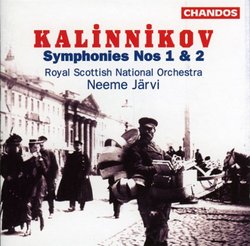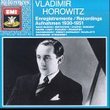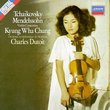| All Artists: Vasily Kalinnikov, Neeme Järvi, Royal Scottish National Orchestra Title: Kalinnikov: Symphony Nos. 1 & 2 Members Wishing: 0 Total Copies: 0 Label: Chandos Release Date: 4/22/1997 Genre: Classical Style: Symphonies Number of Discs: 1 SwapaCD Credits: 1 UPC: 095115954621 |
Search - Vasily Kalinnikov, Neeme Järvi, Royal Scottish National Orchestra :: Kalinnikov: Symphony Nos. 1 & 2
 | Vasily Kalinnikov, Neeme Järvi, Royal Scottish National Orchestra Kalinnikov: Symphony Nos. 1 & 2 Genre: Classical
|
Larger Image |
CD DetailsSimilarly Requested CDs
|
CD ReviewsFast Paced and Bright, It May Be Too Much for Some R. Michael Craig | Snohomish, WA | 06/23/1999 (3 out of 5 stars) "Vasily Serge's life is another example of an incredibly talented artist's being taken before his/her full bloom. Based upon the few works he left, one can only guess as to what greatness he might have arisen. I have the separate CD's of the two symphonies which are the basis for this release. I found that the performances seem to emphasize the brass section of the orchestra which gives the recordings a rather bright tone that can cause listener fatigue under certain situations. The tempo of the second symphony is quite quick especialy the last movement marked Allegro vivo. Personally I prefer the interpretations of these two symphonies by The Symphony Orchestra of Russia conducted by Veronika Dudarova. Performed at a more moderate tempo and with a warmer tone, this recording has a more sonicly pleasing presentation to these ears. Regardless of the orchestra, listening to these symphonies will cause one to grieve about Kalinnikov's short life. Perhaps had he lived his name would be up with those of the great Russian composers. One can only guess." Good reading except... Russell J. Grasso | Massachusetts, USA | 03/19/2003 (3 out of 5 stars) "Second and third movements of Symphony #1 are wonderful - no complaints. My complaints are with the outer movements.In the first movement, Jarvi does not subscribe to all the dynamic markings in the score, making the reading less interesting than it could have been if the composer's intent was followed more often.The last movement of Symphony #1 is the most disappointing as it is played ludicrously fast, stripping away its impact, detail and majesty in the coda. Being a violinist currently playing this piece in my orchestra, I am familiar with the great moments in this last movement. I can't hear many of these listening to Jarvi's break-neck flurry. It does not provide sufficient resolution to document Kalinnikmov's notable effort. I have no review for Symphony #2 to offer." Wonderful, Exciting works. But why the compilation? David A. Hollingsworth | Washington, DC USA | 05/31/1999 (5 out of 5 stars) "Vasily Sergeyevich Kalinnikov (1866-1901) was on his way of becoming among the bigger forces in late Russian Romantic music. However, obtacles stood in his way during his life. He grew up in poverty during his youth, and although he wanted to enroll as a student at the Moscow Conservatory of Music, he could not afford it. Pyotr Illyich Tchaikovsky, who sympathized with Kalinnikov, recommended him to a conducting position at the Opera Theater in Moscow. Kalinnikov was able to achieve an education and thereafter, began to compose in earnest, completing two symphonies, miscellaneous orchestral scores, piano, chamber, vocal works, as well as an incidental music to the play "Tsar Boris." However, Kalinnikov fell sickened by tuberculosis, and retired to Crimea. He never recovered and passed on just two days before his 35th birthday. By the time of his death, Kalinnikov was an overlooked figure & his works were ignored even by the publishers. It was Sergei Rachmaninov who was instrumental in having Kalinnikov's music published, by Tchaikovsky's publisher, Pyotr Jurgensen .
The First Symphony of 1895 earned Kalinnikov a long lasting reputation, despite problems in getting the work premiered (the insecured Rimsky-Korsakov had low regards for the symphony & the original score was temporarily lost). The work, which brings to mind Balakirev's First symphony, is remarkably fresh, energetic, & inspiring, with the alluring wonders of the andante commodamente movement and the rustic playfulness of the scherzo. It has that appealing Tchaikovskian passion and poetics in the final movement in particular and the idiom is not a world apart from that of the Russian Five (again with Balakirev the main impetus of the work). The Second Symphony (written two years later) is altogether more folksy though quite as appealing as its predecessor. Here, Borodin looms a bit large at this juncture. Gone is the drama of the First Symphony's first movement and in its place is the festive atmosphere that dominates this movement and the finale. The slow movement goes along dreamily. All in all, an endearing work, and conductors like Svetlanov, Kuchar, Kondrashin, Dudarova, and Jarvi were right not to place this work in the back seat of oblivion despite the popularity of the First Symphony. The performances of Neemi Jarvi and the Scottish National Orchestra are affectionate all-round and bestowed with Chandos' usual atmospheric, radiant sound (albeit with a bit less warmth in comparison with the original recordings of these works). The compilation for me though, seems rather superfluous, since in the original albums, Glazunov's "The Sea" and "Spring" as well as Kalinnikov's overture to "Tsar Boris" & "The Cedar and the Palm" were also featured alongside the symphonies: the shorter works that are now scattered with reissues of other works. Moreover, the booklet essay could use a bit more depth. So for anyone who already possesses the original discs of these wonderful, inspiring works, there's really no need to acquire this album. For newcomers, however, this is an appealing buy. But you may have to go out of your way to get Jarvi's renditions of the aforementioned shorter works, by far the best in the catalogue. For my money, the original releases will continue to do just fine, especially when Glazunov and Kalinnikov have so many appealing things to say in these works big and small. And to have them in these two original discs rather than to hunt for them in other (upcoming) reissues is an added luxury." |

 Track Listings (8) - Disc #1
Track Listings (8) - Disc #1




